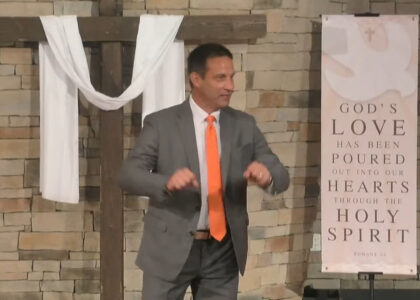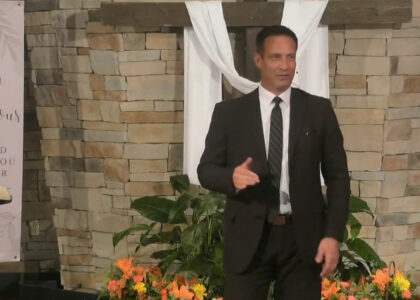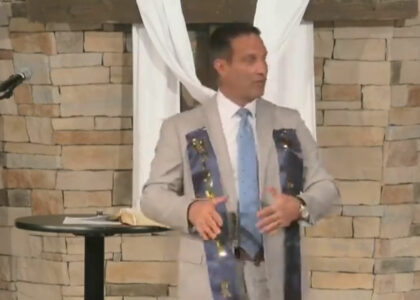Two Paths into One Great Story
Text: Ecclesiastes 3:1-2 (Lk. 1-2; Mt. 1-2)
Watch on YouTube HERE
Introduction
- Ecclesiastes 3:1-2 (NIV) There is a time for everything, and a season for every activity under the heavens: a time to be born and a time to die…
- We often find ourselves during Christmas living in one of two worlds: focused on the beautiful & good things that are part of Christmas or focused on the things that seem out of joint with the way we want Christmas to be.
- How do you deal with this tension?
- Many just deny the other world and those who dwell in it.
- Others feel guilty because of the way they experience Christmas and their awareness of that other way of being in Christmas.
- For the joyous Christmas, this feeling often arises and is suddenly expressed in the middle of everyone’s joy. That mutes the celebration of the moment.
- For the more difficult Christmas, this feeling often arises and is shared as a lament. A resentment of others often arises as the misery grows darker. /Scrooge as an example/
- Is there another possibility?
Explore the Text: Two accounts of Jesus’ birth capture contrasting moods.
- The problem with collapsing both narratives into one story: we may miss what God intends for us to notice and use in our lives.
- Notice what each writer features in the narrative of the birth of Jesus: One focuses on the darkness and danger in the world, and the other focuses on the joy and wonder of God’s action in the world.
- It is important to see how these two different narratives merge into one shared story.Both paths introduce us to Jesus, the one who lived a true life with the Father, who trained disciples in this way of life, & whose death & resurrection was the unexpected twist in the story.
Luke and the Way Most of Us Expect to Experience Christmas
- Luke’s story begins with real people living in a world that is often difficult.
- His characters have little power & are learning to trust & obey God’s will.
- At every turn in the story, we find people and angels breaking out in praise, poetry, and song because God works in unexpected ways.
- Luke intertwines three stories as God reveals himself through angels to
- A priest who struggles to trust that God still works miracles.
- A teenage girl stunned by the greatness of God who invites her into an adventure.
- Shepherds in a field at night who experience the chorus of angels, visit God’s long-expected king in an unexpected place, & become the first evangelists of this good news.
- Luke’s genealogy comes after Jesus’ baptism and the Father’s announcement of his love and pleasure in his son.
- Luke’s genealogy moves backward from Jesus, “the son, so it was thought, of Joseph, to Adam, “the son of God.”
Matthew and the Way Some of Us Will Experience Christmas.
- Matthew’s gospel begins with a genealogy of Jesus that starts with Abraham and moves forward to Joseph, “the husband of Mary, and Mary was the Mother of Jesus who is called the Messiah.”
- In both genealogies, God called sinful people to know & work with him as He fulfills his promises through a long and difficult path.
- Matthews’s story about the birth of Jesus reveals a dark and dangerous world where people in power work to prevent God’s will from being done because they are threatened by God’s promises.
- Their attempts to thwart God are unsuccessful.
- In this dark world, we meet two shafts of light, Joseph and the wise men.
- To survive in such a world, they must pay close attention, trust God, and obey Him, even when things make little sense.
- In Matthew’s account, the only mention of joy is in 2:10: Joseph & Mary are not described as joyful! It is the wise men who are overjoyed when the star “stopped” ahead of them to show them the place where Jesus was born.
- Note: In 2:11, Matthew says that they came to the house & saw the child and his mother, Mary. They arrive later than the shepherds.
- The tone of fear in Matthew is not a fearful awe of angels and of what God is doing, but a fear of the dangerous, powerful people who are threatened to hear about the birth of a long-expected Messiah/king.
- The secret return of the wise men, the escape to Egypt, Herod’s slaughter of small boys around Bethlehem, and Joseph & Mary’s return to Nazareth all emphasize the dangers and darkness of this narrative! (2:13-23)
Matthew & Luke Are More Coordinated as Their Story of Jesus Proceeds.
- This newborn king embodies the presence of God’s kingdom with us. Immanuel, God with us, is mentioned in Matthew’s dark account.
- Jesus invites us to a life rooted in and directed toward God’s kingdom.
- “Your kingdom come, your will be done, on earth as it is in heaven” is not just a line in a prayer; it is the longing desire and aspiration of every disciple called to follow Jesus the Savior-King.
Paul helps us see how life in the world with Jesus has profound implications as we live with our eyes fixed not on what is seen but on what is unseen.
- 2 Cor. 4:16-18—this understanding is based not so much on the story of the birth of Jesus, but on his life and teaching, death and resurrection as they reveal what his incarnation means.
- Phil 3:7-14—We see how Paul’s steady reliance on the unseen creates a life of rejoicing even during great suffering and difficulty.
Conclusion: Given these two perspectives Is there another possibility, no matter what my experience of this season is like?
- If you expect a Christmas of great joy
- Be thankful, and do not take God’s blessings for granted!
- Praise Him as the giver of all good things.
- Be mindful of those who struggle. Consider reaching out to them.
- If you expect things to be difficult this Christmas.
- Remember that you are not alone and that others are also struggling, even if you cannot see it behind their appearance.
- Like Joseph in Matthew’s story, lean on God and trust Him, even when things feel dark and dangerous: Hold on to Immanuel, God with us even in the darkness.
For All of Us: There can be unexpected moments of joy and gratitude that are not based on how much or little we have. Consider a snapshot taken from the Christmas Carol:
Scrooge before his heart changes as he visits the Cratchit House with the Ghost of Christmas Present:
As Scrooge and the Ghost of Christmas Present leave the Cratchit house and the scene begins to fade, Scrooge watches the Cratchits closely:
“They were not a handsome family; they were not well dressed; their shoes were secondhand; their clothes were scanty. But they were happy, grateful, pleased with one another, and contented with the time; and when they faded, and looked happier yet in the bright sprinklings of the Spirit’s torch at parting, Scrooge had his eye upon them, and especially on Tiny Tim, until the last.”





